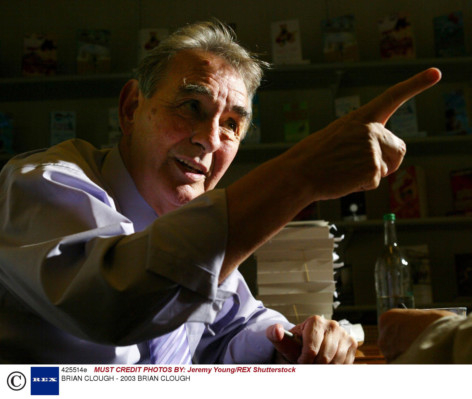
Dubai
Brian Clough’s fairy tale reign at Nottingham Forest still serves as an inspiration to smaller clubs 40-years on, according to former Tricky Trees striker Tony Woodcock.
Woodcock, 59, played under Clough for four years from 1975, and lifted seven trophies including the first of Forest’s two historic back-to-back European Cup titles, before he was sold to Germany’s FC Koln for £600,000 (Dh3.46 million) in 1979.
Clough would go on to win three more titles after Woodcock’s departure, before his 18-year spell in charge of The Reds ended in relegation and alcoholism in 1993.
But despite that undignified end ‘Old Big Head’ — as he was more commonly known — would go down in folklore as ‘the greatest England manager that never was’ when he died of stomach cancer aged 69 in 2004.
“It’s amazing that people are still talking about it 40-years on,” Woodcock said of Clough’s early days at Forest, during an ‘audience with’ at Girders in JA Ocean View Hotel in JBR recently. “It was a footballing fairy tale.
“We won everything together, we had a great bunch of lads, a great camaraderie and we all trusted one another. We would play teams on mud and ice and still win.”
Unfancied Forest dropped back down the divisions as quickly as they had emerged after Clough’s tenure. And it’s that message to smaller clubs in the money-orientated world of modern football that Woodcock says still stands today.
Always an optimist
“I hate it when people say ‘we can’t go any further because we haven’t got any money’,” said the Nottingham-born forward who scored 36 goals in 129 appearances for his local club. “Make the good players into better players and the average players into good players and try and get a system going and some camaraderie together so that you can go and win something.
“I refuse to believe it can only be about money, that the best clubs can only win something because they’ve got the best players. I like to think small clubs can still do it because if it’s only about the best players and you can’t fight them then it’s sad for the game.”
It was Clough, Woodcock said, that shaped him into the player he became — an Arsenal and England legend with 16 goals in 42 appearances for his country.
“I was useless and didn’t feel good in myself before Cloughie came,” he said. But it’s not as if the renowned taskmaster had an instant effect on him either.
Clough left the 19-year-old out of the team, had him polishing boots, sent out on loan, and when he did eventually score for the reserves Clough would only scold him for appearing unshaven. Woodcock would then be played out of position and heckled by the Yorkshireman, until he eventually snapped.
“I finally got the nerves to challenge him in the car park and said ‘coach, when you shout at me it puts me off and I lose confidence’, but he just looked me in the eye and said ‘well you can’t win them all can you?’
“That was the defining moment for me, I said to myself ‘just forget him and play your own game.’ I thought I was finished at Forest anyway, but two weeks later the rest was history.
“To this day I don’t know whether he was trying to break me or he genuinely didn’t know what a centre-forward was. He’d never say you were good, he’d just say you were a credit to the game.
Building character
“Through all the goals and England caps, in the background you’ve had to fight your way through things and it’s that, that builds character. It’s these difficulties that mould you and make you the player and person you become.”
Despite Clough’s hold over the players, there were still legendary tales of insubordination. Woodcock recalls that Clough rang down to the boot room and asked an apprentice to make him a cup of tea, but the apprentice said [No]. Clough replied: ‘Do you know who I am?’ And the apprentice said: ‘Yes, but you don’t know who I am,’ before slamming the phone down and getting out of the boot room before Clough came running down the corridor.
“He knew what he wanted and it was quite simple,” added Woodcock. “He would say there are four things he wanted you to do, and if you reach them all you are at 80 per cent of your ability. There are days when you go above that but you never drop below. If you achieved all this in matches there would be no comebacks.
“Otherwise, he wanted honesty on the field and integrity in the way you played. He didn’t want you cheating referees or swearing if the ref blew his whistle. And he wanted you to be generous with your time for the fans. So, there were a lot of values there that were good for the game. We had all those things and used to pick up trophies too.
“Even before he died he used to get us all together and say ‘I used to tell these lads what to do, but now they are all my friends’ and we all remain very close.”
Does Woodcock have any regrets about leaving Forest for Germany so soon into Clough’s tenure?
No regrets
“No, I had a plan, I had won everything at Forest and came up through the ranks as an apprentice and fancied a change, a different culture, language and more money. I wanted everything that came with being a successful footballer and I was a bit different by going abroad. It was clear to me that I would go one day and it happened at the right time as far as I was concerned.”
And as to whether Clough was indeed the greatest England manager that never was, Woodcock added: “He should have been given a chance, it would have been fascinating to see how he would have done, but then you’ve got the Football Association that decides.
We were all shocked when he didn’t get it. He had won everything, developed young players and put the jigsaw pieces into place, he just kept it simple and he used to say that’s the hardest thing to do in football.”











